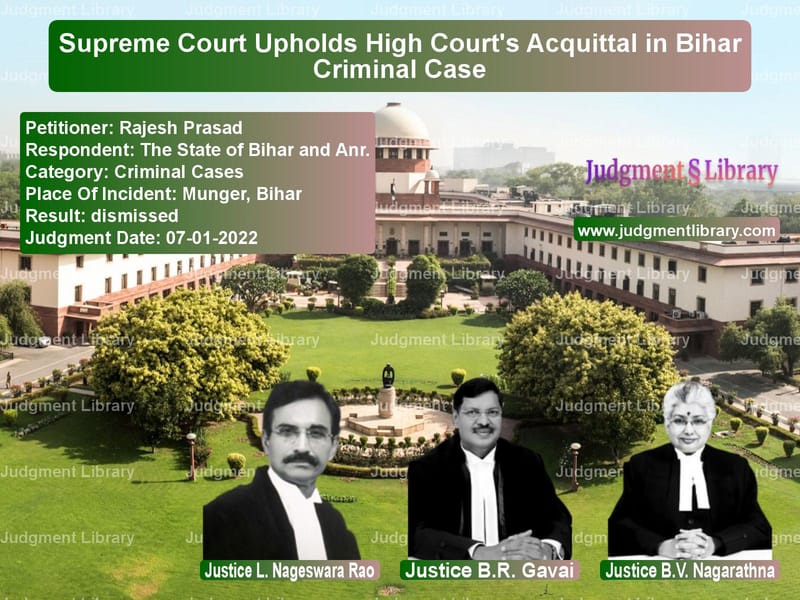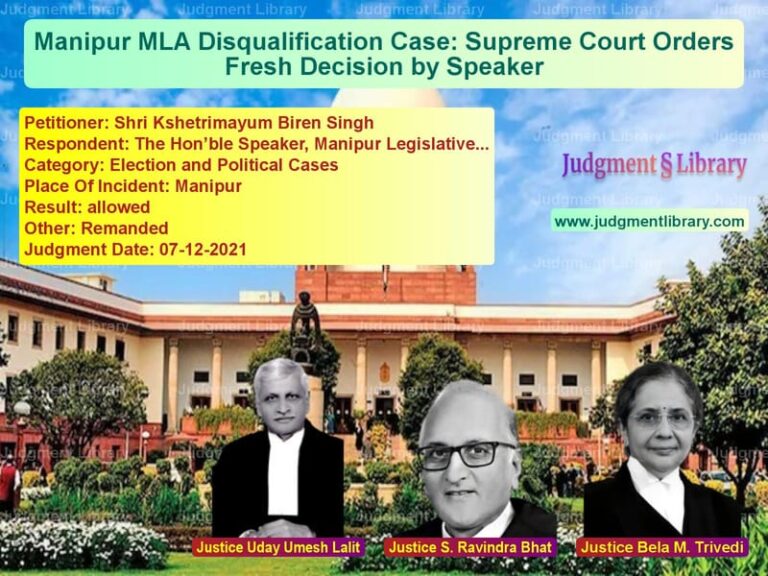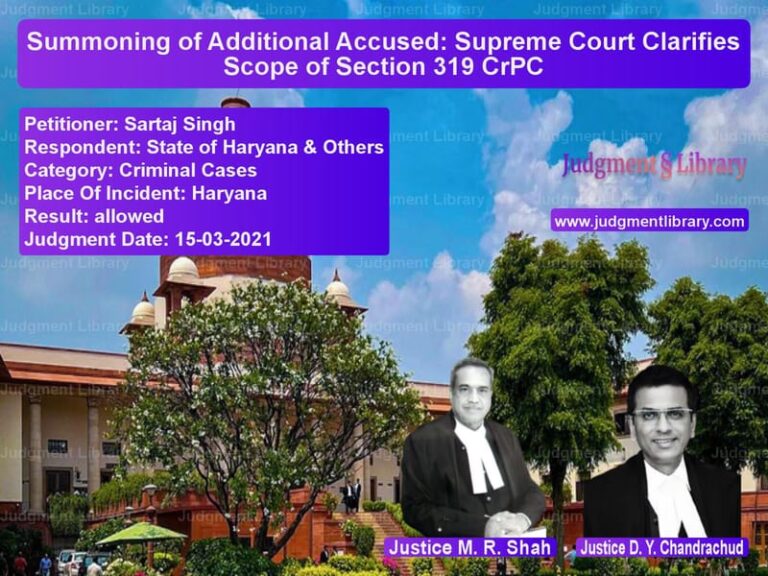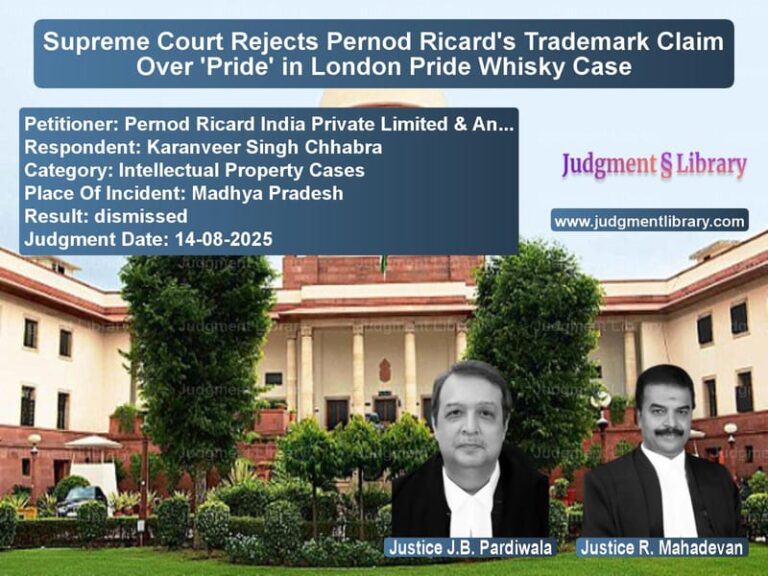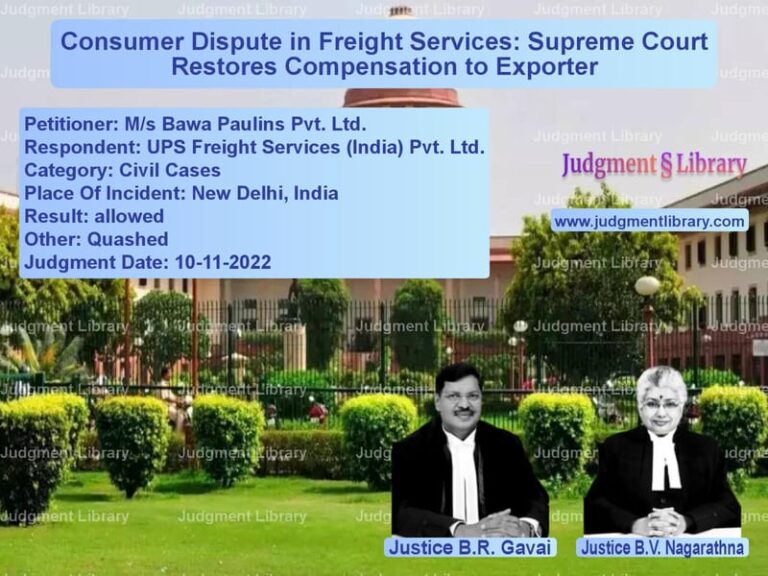Supreme Court Upholds High Court’s Acquittal in Bihar Criminal Case
The Supreme Court of India, in its ruling on Rajesh Prasad vs. The State of Bihar & Anr., has upheld the High Court of Patna’s decision to acquit the accused in a high-profile criminal case. The case involved multiple bomb attacks leading to the death of two individuals and significant legal scrutiny over the credibility of evidence and witness testimonies. The judgment underscores the critical role of consistent and reliable prosecution evidence in criminal trials and the standards required for conviction beyond a reasonable doubt.
Background of the Case
The incident occurred on March 10, 2005, at approximately 5:00 PM in Munger, Bihar. The prosecution alleged that the accused—Mahendra Ram, Upendra Ram, Munna Ram, and others—threatened Rajesh Prasad (the appellant) and his family for opposing their illicit liquor business. This dispute escalated into violence when the accused reportedly threw bombs, resulting in the deaths of Chhote Lal Mahto (the father of the appellant) and O.P. Verma, a bystander. The third bomb, thrown by Upendra Ram, exploded on the road but did not cause harm.
After the police investigation, a chargesheet was filed under Sections 302, 307, 120B of the Indian Penal Code (IPC) and Sections 3 and 4 of the Explosive Substances Act. The case was tried before the Fast Track Court of Munger, which convicted the accused, sentencing two of them to death and another to life imprisonment.
High Court’s Acquittal
The convicts appealed to the Patna High Court, which overturned their convictions, citing procedural irregularities, inconsistencies in witness testimonies, and lack of independent corroboration. The High Court found that the prosecution’s case rested primarily on the statements of eyewitnesses, but their testimonies contained contradictions that cast doubt on their reliability. It also noted that forensic evidence did not conclusively link the accused to the crime.
Arguments by the Petitioner (Rajesh Prasad)
- The appellant contended that the High Court erred in disregarding the eyewitness testimonies, which consistently identified the accused as perpetrators.
- He argued that minor discrepancies in witness statements should not overshadow the overall reliability of their accounts.
- The petitioner maintained that the trial court had properly weighed the evidence, and the High Court should not have interfered with a well-reasoned conviction.
- He pointed out that the accused had a clear motive for the crime, as they had threatened his family just before the incident.
Arguments by the Respondent (The State of Bihar & Accused)
- The respondents emphasized the inconsistencies in the prosecution’s case, particularly the shifting statements of key witnesses, including the informant Rajesh Prasad (PW-7).
- They argued that the police investigation was flawed and lacked substantial independent evidence to corroborate the claims made by the prosecution witnesses.
- The defense highlighted the absence of forensic evidence linking the accused to the crime scene and questioned the prosecution’s reliance on circumstantial evidence.
- They maintained that the trial court had erred in placing undue reliance on witness testimonies that were later found to be contradictory.
Supreme Court’s Observations
The Supreme Court, comprising Justices L. Nageswara Rao, B.R. Gavai, and B.V. Nagarathna, upheld the High Court’s acquittal, stating that the prosecution failed to establish the guilt of the accused beyond reasonable doubt.
The Court ruled:
“The fundamental principle of criminal jurisprudence is that the accused is presumed to be innocent unless proven guilty beyond reasonable doubt. In the present case, the prosecution’s reliance on witness statements with material inconsistencies weakens its case to an extent where conviction cannot be sustained.”
Regarding the credibility of witnesses, the Court observed:
“Witness testimony must be consistent and reliable to form the basis of conviction. The discrepancies in the statements of the prosecution witnesses in this case cast serious doubt on the veracity of their claims, leading to an inevitable benefit of doubt to the accused.”
The Supreme Court also addressed the procedural lapses highlighted by the High Court:
- “Failure to secure independent witnesses weakens the evidentiary foundation of the prosecution’s case.”
- “Forensic evidence did not conclusively establish that the explosive devices were planted by the accused.”
- “The reliance on uncorroborated statements that contain contradictions cannot form the basis of a death sentence.”
Final Judgment
- The Supreme Court dismissed the appeal and upheld the High Court’s acquittal of the accused.
- It ruled that the benefit of doubt must go to the accused in cases where the prosecution fails to establish guilt conclusively.
- The Court set aside the High Court’s directive to initiate perjury proceedings against Rajesh Prasad.
Implications of the Judgment
- This ruling reinforces the principle that a conviction must be based on unimpeachable evidence, and mere suspicion or motive is insufficient for criminal liability.
- It highlights the importance of procedural diligence in criminal trials, emphasizing that independent witnesses and forensic corroboration play a vital role in securing convictions.
- The judgment sets a precedent for future cases, ensuring that appellate courts thoroughly examine witness reliability before overturning or sustaining trial court verdicts.
- It safeguards the rights of the accused by reaffirming that benefit of doubt must be granted when inconsistencies exist in the prosecution’s case.
Petitioner Name: Rajesh Prasad.Respondent Name: The State of Bihar and Anr..Judgment By: Justice L. Nageswara Rao, Justice B.R. Gavai, Justice B.V. Nagarathna.Place Of Incident: Munger, Bihar.Judgment Date: 07-01-2022.
Don’t miss out on the full details! Download the complete judgment in PDF format below and gain valuable insights instantly!
Download Judgment: rajesh-prasad-vs-the-state-of-bihar-a-supreme-court-of-india-judgment-dated-07-01-2022.pdf
Directly Download Judgment: Directly download this Judgment
See all petitions in Bail and Anticipatory Bail
See all petitions in Attempt to Murder Cases
See all petitions in Fraud and Forgery
See all petitions in Theft and Robbery Cases
See all petitions in SC/ST Act Case
See all petitions in Judgment by L. Nageswara Rao
See all petitions in Judgment by B R Gavai
See all petitions in Judgment by B.V. Nagarathna
See all petitions in dismissed
See all petitions in supreme court of India judgments January 2022
See all petitions in 2022 judgments
See all posts in Criminal Cases Category
See all allowed petitions in Criminal Cases Category
See all Dismissed petitions in Criminal Cases Category
See all partially allowed petitions in Criminal Cases Category

